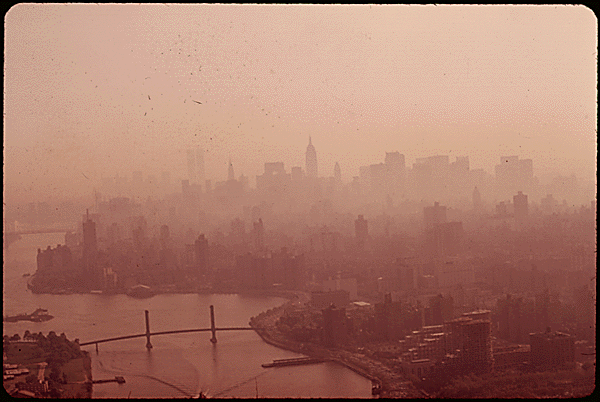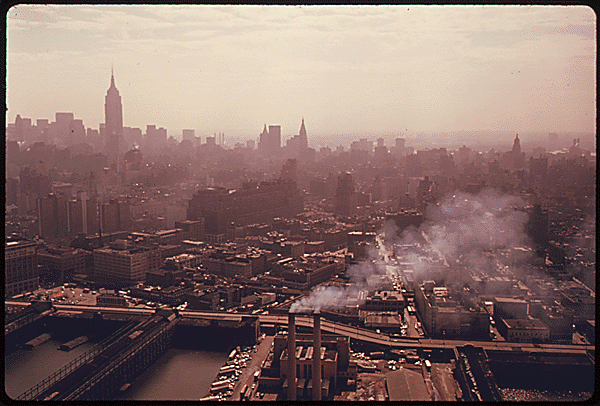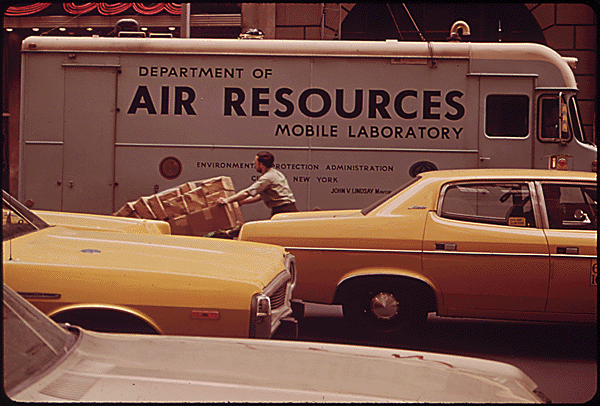Toxic air: why is New York cleaner than London?

Forty years ago the people of New York were breathing air that looked like this.
As citizens of the Big Apple and other US cities struggled to see through the haze, the government was starting to roll out air pollution regulations, driven by the 1970 Clean Air Act.
Today, one year on from the scandal that revealed the German car giant VW cheating emission tests, New York’s air is far cleaner. This is in spite of spiralling energy consumption, economic growth and a population boom. The city has laid claim to the biggest bike share in the country and even the classic yellow cab is going electric on a vast scale.
“People are living longer,” Janice Nolen, assistant vice president at the American Lung Association told Unearthed.
“They have fewer asthma attacks, fewer heart attacks, and fewer hospital and emergency department visits. The air is likely much cleaner looking too.”
Archived photographs from a project documenting the environment in the USA during the 1970s show how much the air has changed.

The link between increased life expectancy and reduced pollutants has been most beneficial in cities and densely populated areas, research shows.
The levels of particulate pollution in New York – a notorious pollutant known to exacerbate lung damage, heart disease and respiratory problems – now sit comfortably below levels considered unsafe by the World Health Organisation.
It is not so in London. Particulate levels are significantly higher.
London’s air quality has been flouting legal limits for years. This year London breached its limits within a single week, while in 2013 Marylebone road recorded the highest levels of nitrogen dioxide among more than 110 stations across Europe that submitted data to the European Environment Agency.
The difference is diesel
Experts say the main difference between London and New York is diesel cars. In fact the UK technology to limit pollution in diesel cars is so lax that even buses and heavy trucks are less toxic. Diesel engines emit several pollutants, but the main culprits are nitrogen oxides and particulate matter (PM). They have been linked to 40,000 early deaths every year in the UK.
The US Clean Air Act introduced the processes for the Environmental Protection Agency (EPA) to begin large scale monitoring of air pollution.

According to Nolen, the Act chiefly targeted two sources of particulates: coal power plants and diesel engines.
But in the UK while emissions from coal plants have dropped substantially, diesel is still a huge problem. Or, in the words of former science minister Lord Drayson, diesel cars are “literally killing people”.
And in the UK there are more diesel cars than in the US. A lot more.
Diesel’s share of the US market is around 3%. In the UK, it is almost 50%. And last year in London, diesel’s share hit a record high.
It hasn’t always been that way. The diesel industry in the UK – and across Europe – has mushroomed since Gordon Brown introduced tax breaks for diesel vehicles in 2001, in a push to meet EU rules on cutting carbon emissions. Experts have since concluded that “the European diesel car boom did not cool down the atmosphere”.
Meanwhile in the US, the EPA introduced new rules to cut pollutants from diesel sources, requiring local governments and states to meet health based air quality standards.
Although all new diesel cars sold since 2011 come with a particle filter, many people are still driving around vehicles sold before this date. Research also shows that defects are widespread in the filters and that 90% of new diesel vehicles on the road are breaking EU limits when tested on the road.
UK vehicles are inherently more polluting too – EU standards permit them to emit twice the concentration of nitrogen oxides as US standards do.
And that’s if manufacturers obey the rules.
One year ago the US government ordered Volkswagen to recall close to half a million cars, accusing the company of using illegal software to falsify emissions tests, thus breaching the Clean Air Act.
But in the UK, both manufacturers and government have seemingly less to fear.
Although courts are starting to take action in Europe, progress is slow. If a country fails to comply, they can apply for an extension before the European Commission has any right to start issuing letters and finally initiate legal action. But in the US the Clean Air Act gives the national government power to intervene directly.
Consider also the reaction to the VW scandal on both sides of the pond.
In the US, VW agreed a €15bn deal with regulators to compensate consumers and fund environmental measures.
In the UK, where the scandal affects 1.2 million cars, no deal or legal action has been brokered and a cross party MPs have warned that the German car giant could get off the hook because the government has failed to act and regulators “have shown little interest” in establishing illegal activity.
The US regulator, the EPA, is an independent public body. It conducts random tests by taking vehicles off production lines and off the street.
But it’s a “race to the bottom” for regulators across Europe, says Julia Poliscanova, an expert on clean vehicles and air quality at the think-tank Transport and Environment.
Because of the EU’s single market, manufacturers can choose from any of the 28 European approval authorities to certify their cars – and then sell their vehicles across the continent.
“The US testing system is much more robust and effective than in Europe, where there is no strong independent regulator or in-use surveillance testing. Carmakers can go to one authority and get approval for the whole market – so they shop around. Regulators compete for money and try to protect their manufacturers.”
The Vehicle Certification Agency is the UK government’s regulator, but the public body only witnesses the tests carried out by manufacturers in their own laboratories.
It also takes over two-thirds of its income from these manufacturers.
So will anything change?
Two weeks ago the European Commission announced it is starting to co-ordinate lawsuits against VW in 20 EU states.
Poliscanova is optimistic.
“It took a scandal with defeat devices to bring about change in the truck industry. The dieselgate scandal will hopefully sort out the current emissions abuse in the car industry too.”

